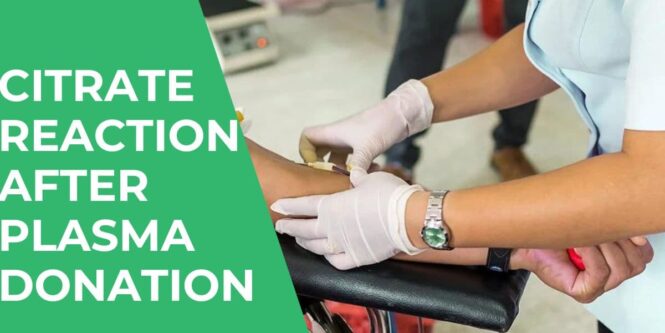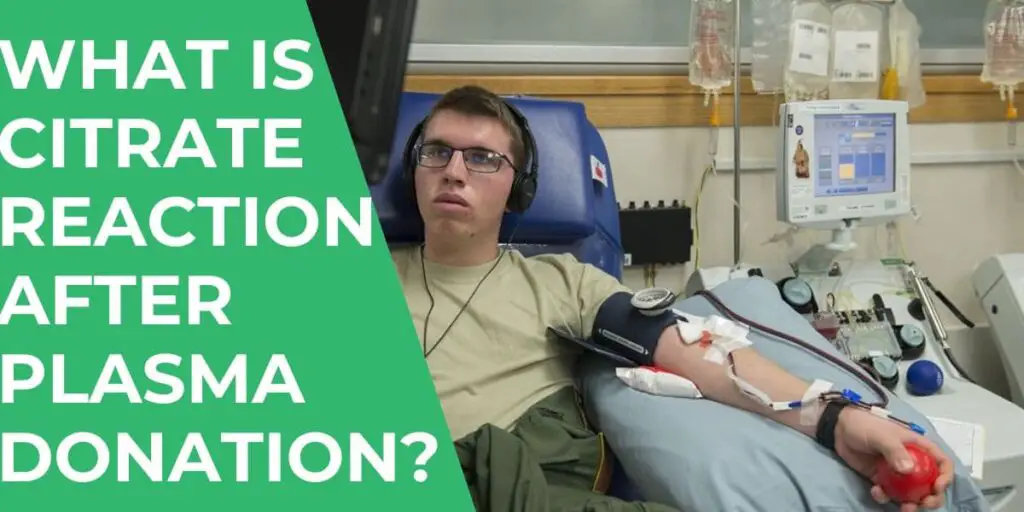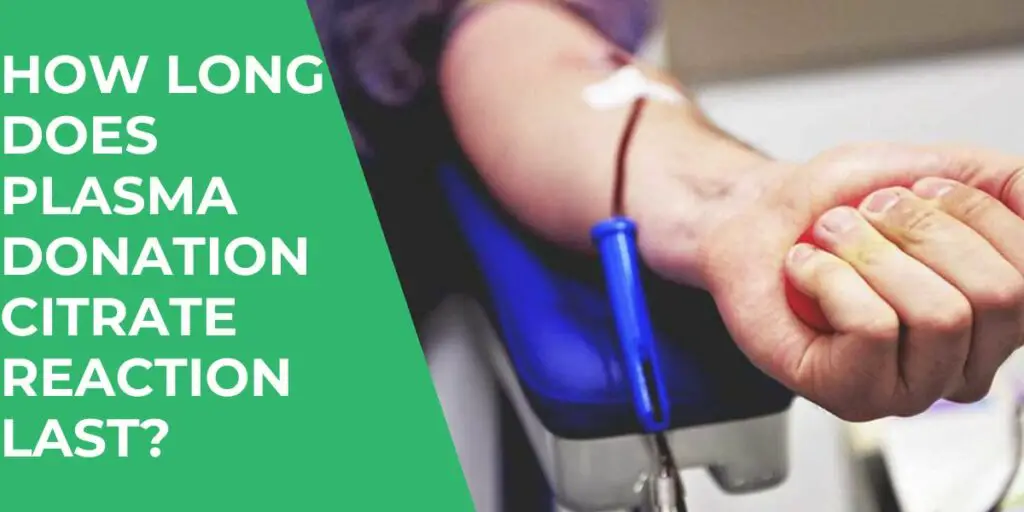
I’ll never forget the day I experienced my first citrate reaction after donating plasma. There I was, feeling like a superhero, when suddenly my body had other plans.
If you’ve ever had a similar experience, or you’re curious about what can happen post-plasma donation, you’ve come to the right place!
Today, we’ll shed light on Citrate Reaction After Plasma Donation, why it occurs, and how to get rid of it.
What is Citrate Reaction After Plasma Donation?

Citrate reaction after plasma donation occurs when the anticoagulant citrate used in the collection bag enters the donor’s bloodstream. A citrate reaction can lead to numbness and cramping of the hands and feet if not treated.
Have you been wondering why they check your elbow when donating plasma? Check my post on Why Do They Check Your Elbows When Donating Plasma for a detailed explanation.
What Causes a Citrate Reaction After Plasma Donation
Citrate Reaction after plasma donation is caused by the anticoagulant citrate used to prevent blood from clotting during the donation process. Citrate binds to calcium in the donor’s blood, preventing coagulation. However, too much citrate entering the donor’s bloodstream can lower calcium levels, leading to a citrate reaction.
What Are the Symptoms of Getting a Citrate Reaction After Donating Plasma?
The symptoms of getting a citrate reaction after donating plasma are:
- Numbness: A tingling sensation in the hands and feet may occur due to the citrate reaction.
- Cramping: Muscle cramps in the hands and feet are another common reaction symptom. They can be mild or severe and leads to discomfort or pain.
- Dizziness: Some individuals may experience dizziness or lightheadedness due to the reaction.
- Nausea: Nausea or vomiting can also occur from nitrate reactions.
- Rapid Heart Rate: Citrate reaction can cause the heart rate to increase. This can lead to a sensation of a rapid or pounding heartbeat.
Do you know plasma donation can have some side effects on your health? Check my post on the Risks of Donating Plasma for more details.
How to Recover from Citrate Reaction
Follow these steps to Recover from Citrate Reaction:
- Seek medical attention: If you experience any symptoms of Citrate Reaction after donating plasma, it’s essential to seek medical attention immediately. This will allow medical professionals to evaluate the condition and treat the reaction.
- Manage symptoms: Medical professionals can manage the symptoms of the reaction, which may include administering calcium or other treatments as needed. These treatments aim to alleviate the symptoms and prevent any complications.
- Stay hydrated: Drinking fluids before and after plasma donation can help minimize the risk of experiencing citrate reactions. Make sure to follow the instructions provided by the medical staff regarding fluid intake.
- Maintain a healthy weight: Being overweight can increase the risk of citrate reactions. To help minimize this risk, ensure that you maintain a healthy weight.
- Follow instructions: It’s essential to follow the instructions provided by the medical staff before, during, and after plasma donation. This will help to minimize the risk of a citrate reaction.
Before we dive deeper into citrate reactions, you might also be wondering about other side effects of plasma donation, like fatigue. Don’t worry; we’ve got you covered! Check out our related article Does Donating Plasma Make You Tired?
How Long Does Plasma Donation Citrate Reaction Last?

Plasma Donation Citrate Reaction lasts about 4 to 32 hours. In some cases, you might experience these reactions for several days.
Preventions to Avoid Citrate Reaction After Plasma Donation
To avoid citrate reactions after plasma donation, do the following:
- Stay well hydrated before and after donation.
- Avoid alcohol consumption before and after donation.
- Eat a well-balanced meal before donation.
- Inform the medical staff of any medical conditions or medications.
- Remain seated for at least 10-15 minutes after donation.
Effects of Citrate Reaction After Plasma Donation
The effects of citrate reaction after plasma donation include the following:
- Hypocalcemia: Citrate binds to calcium, leading to low calcium levels in the blood. This can result in numbness, muscle cramps, and spasms after plasma donation.
- Cardiac complications: Citrate can affect the heart’s electrical system. After donating plasma, these complications can lead to chest pain and shortness of breath.
- Nausea and vomiting: Excess citrate in the blood can irritate the stomach lining. After plasma donation, this can lead to nausea, vomiting, and abdominal pain.
- Dizziness and fainting: Citrate can cause a drop in blood pressure, leading to dizziness and fainting after donating plasma.
Don’t forget to check out our related article on the benefits of having a protein shake before donating plasma. It might just be the perfect pre-donation ritual to help your body stay strong and energized!
Frequently Asked Questions
These are the Frequently Asked Questions on Citrate Reaction After Plasma Donation:
What should I do if I experience a citrate reaction after donating plasma?
If you experience a citrate reaction after donating plasma, notify the staff immediately, and follow their instructions.
Is the citrate reaction that occurs after donating plasma dangerous?
While citrate reaction can be uncomfortable, it is generally not dangerous and usually resolves on its own.
How soon after plasma donation can citrate reaction occur?
Citrate reaction can occur shortly after plasma donation, usually within the first hour.
Can citrate reaction lead to any long-term health problems?
Citrate reaction does not lead to any long-term health problems.
Conclusion
Plasma donation has saved countless lives, but it comes with a few side effects. One of the most common side effects is citrate reaction. This occurs when the anticoagulant used to prevent blood from clotting during donation affects the calcium levels in the donor’s blood.
While citrate reaction can cause reactions, it is generally not dangerous and resolves on its own. If you experience a citrate reaction after plasma donation, notify the medical staff immediately, and follow their instructions.
Staying well-hydrated before and after the donation is essential, as dehydration can increase the risk of citrate reaction. Plasma donation can be a safe and exciting experience with proper precautions.
